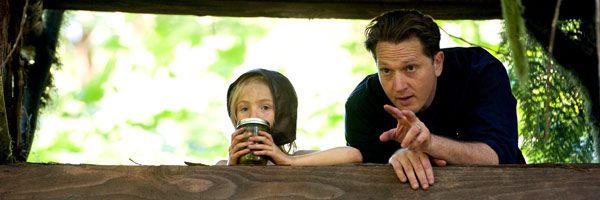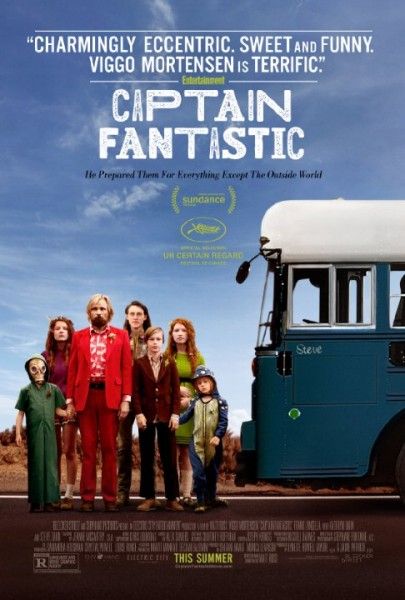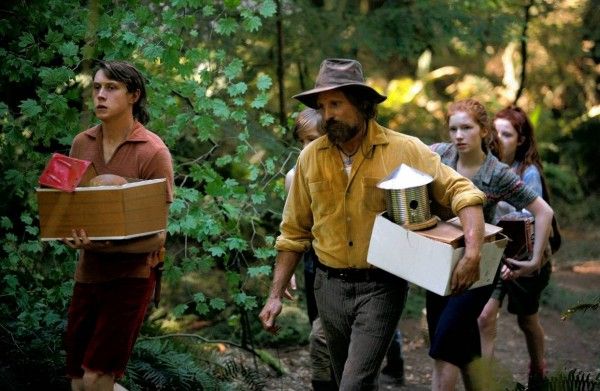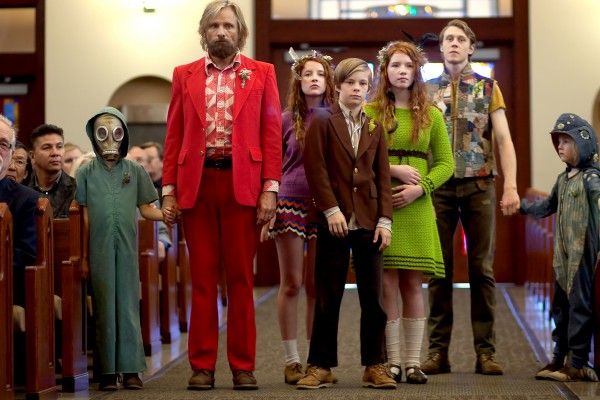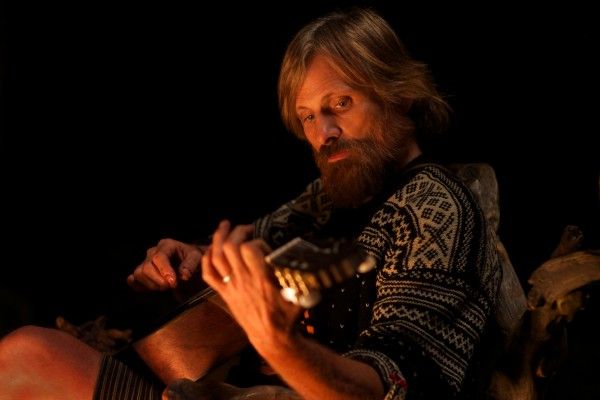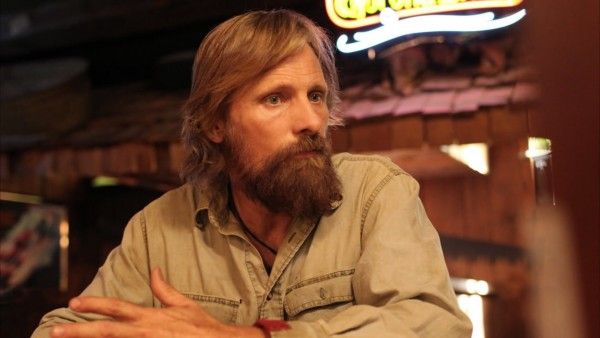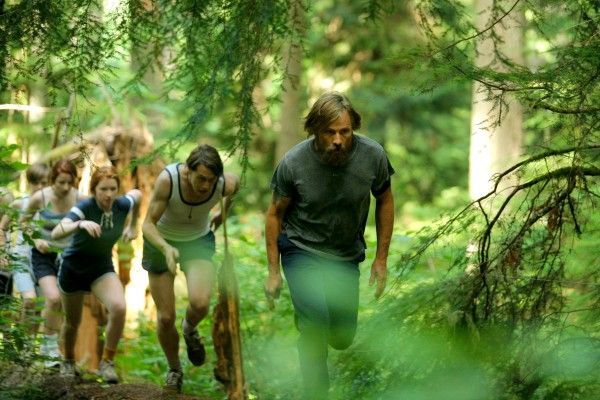While the summer movie season was littered with a surprisingly high number of big budget films failing to connect, equally surprising (if underreported) were the number of smaller, indie movies that thrived in the summer marketplace. Hunt for the Wilderpeople, Hell or High Water, and Love & Friendship – all built on critical word-of-mouth to become sleeper financial-hits. It was the summer of ‘the little engine that could’ and nothing better personifies the trend than Matt Ross’s Captain Fantastic.
An intimate film about a father (Viggo Mortensen) raising his children away from the hustle-and-bustle of modern society, Captain Fantastic ably dissects American cultural values – a society increasingly built on freewheeling technological innovation whilst sheltered from harsher real-world realities. It’s a film about how we raise our children, how we shape them into our idealized self and the inevitable disappointment (and acceptance) that follow when they come into their own. Heavy stuff to be sure – but Captain Fantastic always retains a light touch even during its most thoughtful pontifications.
The film’s been steadily playing in select theaters for the past two months, gaining momentum through word-of-mouth and critical raves. Now the film’s set to hit international markets (having just been released in the UK and opening soon in France & Mexico). In anticipation of the film’s Mexican premiere at the Los Cabos Film Festival, I spoke on the phone for over thirty-minutes with Captain Fantastic’s writer/director Matt Ross.
In the following wide-ranging interview with the filmmaker, Ross discusses the international reception to Captain Fantastic, his writing & rewriting process, storyboarding and how his experiences as an actor influenced his approach. For the full interview, read below.
Now that Captain Fantastic’s gearing up for international release [the film’s already been released in Germany & the UK and is going to be released in Mexico at the Los Cabos Film Festival] – what’s been the reception to the movie internationally?
Matt Ross: Actually the first international reception was at Cannes in May. That was the first time we showed it to any non-US audience. That audience may be largely French but I feel like they're people from everywhere. So I hesitate to single out a particularly French response as opposed to an international response. I would say they were more vocal about certain things reflective on US culture. I think that's to be expected. Recently I've been to the UK. We showed it in front of two thousand people there and we showed it in Copenhagen. You get a similar response. It's just the strength of the response may be different depending on the culture.
I mean -- the movie is so entrenched in American customs and culture. Does that translate overseas – this American cultural clash?
Ross: It really does. What I've noticed -- and I'm speaking very generally -- is the foreign audiences are somewhat surprised and happy to find an American film that asks questions about American culture. There's a certain kind of cultural imperialism that we practice. Our films penetrate every market in the world. You go to any country in the world and their multiplex is filled with our films. I have seen and have had people reflect to me, maybe not in so many words or specifically, but I get the subtext of it -- they're somewhat charmed and surprised and happy to see an American film reflect on our culture. Because they see other cultures reflect on our culture but they don't see US culture reflecting on itself in quite the same way.
Moving back to the beginning, [how did you go about] getting Captain Fantastic made?
Ross: I gave the script [after] Sundance in 2012 to the producer Lynette Howell Taylor. Then we tried to put it together. We shot in the summer of 2014 -- which was two years later and that was largely based on Viggo [Mortensen]'s schedule. The real truth is - I'm sure you've been to film festivals or places where someone wins an award or they're giving a speech and they say ‘I've been working on this movie for six years.’ How the hell did that happen? But once you get into financing a movie yourself, you realize ‘Wow - six years is pretty good.’ So for us - getting the movie together in two years was actually pretty quick.
No – that sounds incredibly quick.
Ross: Yeah – especially given the economics of independent financing today and the health of the industry. There was actually talk of the movie coming out last summer but I was still waiting on a couple things. A lot of [the waiting] has to do with if the [film’s] not purchased, then it becomes about when you're going to a film festival and which festival you’re going to. Independent films have to sell to distributors. Captain Fantastic was actually purchased earlier so in conjunction with our producing partners, our financers and our distributors, we talked about the year and which film festival [to play] and how that leads to [a release]. Toronto and Telluride are gateways to a fall release. Sundance is more of a gateway into a spring or summer release. All this stuff has less to do with making the movie and everything to do with attracting an audience and selling the movie. But you get sucked into this whole thing because there are a zillion movies and they're all jockeying for position.
How long did the first draft of Captain Fantastic take to write?
Ross: That's always a difficult thing to identify because sometimes you write something very quickly and you rewrite it for a long time. But I would say I had a sixth or seventh draft after about a year. I've found that it's usually draft six or seven before anyone in industry reads it.
How does the movie shift during those drafts?
Ross: The first idea was a pretty radically different one. The genesis had to do with parenting and questions about parenthood and fatherhood specifically. I have two kids and I was grappling with what my values were and what I wanted to pass to my children. So I was positing different kinds of parents and different ways of parenting. I played with various ideas -- very permissive parenting, very restrictive parenting and then I came up with this character [the Viggo Mortensen father] - much of it was aspirational, some of it was autobiographical. The real truth - like anything, you have an idea about something you might write and it changes. People reflect on it or you get other ideas and maybe your original idea is radically different than how it ends up being. It's not a theorem. You don't sit down and prove something. You start with an initial idea and it grows and grows. The math of the narrative changes. In some ways your original document and what the film ends up being are quite different; but not at its heart. I think thematically or in terms of the questions I had – that didn't change. The impetus to do the film didn't change but maybe the literal manifestation changed a bit.
Do you typically start with a character and then build the film around the character? Or is it more plot-based?
Ross: In this case - I think the character was secondary to questions I had about parenting. The things I'm writing now - I'll sometimes have an idea for a character. Actually maybe that's not entirely truthful. There were questions I had and then I thought of characters that would help manifest that. It's funny because the way Viggo ends up interpreting the character is slightly different than how I actually wrote it.
How different was the character from the page to what Viggo Mortensen brought to it?
Ross: I think the character as originally conceived was a little bit more... he had a bit more of a twinkle in his eye, a little more of a trickster. Not a jokester because that implies a broad comedic performance. What [the character’s] doing is so extreme and rigid, I thought one of the ways he would counter balance that is with a real 'joie de vivre' - a real playful, fun father. So he was constantly mocking his children and playing with them and poking at them. It was different kind of energy. More like Mercutio in Romeo and Juliet. A guy that you love and want to be around. Not obnoxious but playful. But that's just not Viggo's energy and I never really talked to him about it. I just let him reflect and interpret [the part] as he would. I liked what he did because what he does is bring credibility and an authenticity. I thought that was just as valid of an interpretation.
Do you look to other films or precedents when you're writing the screenplay?
Ross: I don't. Invariably I'm influenced by certain things I may not even be conscious of. Anytime you see a movie, you go ‘Oh it kinda reminds me of Star Trek with a little bit of Alien.’ We all do that. When people read [Captain Fantastic’s] screenplay, they go ‘oh it kinda reminds me of this and a little bit of that.’ But I'm not conscious of that. The only thing that I was conscious of was that I wanted to create something that was psychically hopeful. I think Pixar does this very well. Their movies are emotional without being empty. They're sentimental but they earn it. Film is a pretty poor medium to deliver a message. I'm not trying to do that. I'm just trying to ask a lot of questions and hopefully you can draw your own conclusions about whatever meaning might be there or what point there is; but I was conscious of wanting to create something that for a lack of a better word had a positivity and earned that.
Given that you know that you're going to direct the film, how does that then influence the writing process for you?
Ross: I try to write the document in a very visual and evocative way. Some writers write things that can't be filmed. Because the document is only able to represent the film and can't be the film itself - they want you to have a reaction that will replicate what it will be when you watch it… but they cheat. So they say things like... when they're describing a character, they'll say 'Jim has a secret but we don't know it yet.'. But how do you film that? Or they'll say 'Jim is the coolest fucking guy in the world and everybody knows it.' But how do you film that? What is that about? So I definitely don't do that. I try to use the language of cinema as much as possible, which is sound and picture. I try to have the document evoke the same things I'm trying to evoke without cheating. So if there's a close-up, I won't write it's a close up; but I'll write it in such a way that you know you're looking at it very closely. Rather than say close up on his eyes you'll just describe his eyes - which means we must be fairly close, if that makes sense.
Absolutely.
Ross: The real answer to your question though is I'm trying to tell the story in as nuanced and complex way as possible. I'm not really staging it that much. What I'm trying to do is separate from the interpretation that happens when you direct. What I've found – I've only done it twice although I've made eight or nine short films, but in terms of feature films, what I try to do is not direct as the writer. I really try to separate the two jobs. I feel like the job of writing an excellent screenplay is different than directing that screenplay. When I'm directing, I really try not to be tied to anything. I don't even have the sides in my hands. I have other things - ideas that I want to make sure I don't forget or that I want to accomplish. The endeavor isn't about propping up the screenplay; but about the communal effort of exploration from a lot of different departments - the actors, the DP, the costume designer -- all these people and myself. Ultimately I can say I like that idea or I don't like that idea… but I don't think it help to be like 'No, no, no - you have to say that line.'
How does the film change once you hit production and on set? Did you do rehearsals by any chance?
Ross: We certainly didn't do traditional rehearsals like you do in theater. I spent time with every child actor by myself and went through the screenplay with them, their part specifically to make sure they understood everything. I also did that with Viggo to bring up questions and ask questions. Through that process, many things are adjusted; but we didn't rehearse in the traditional way. We did do a comprehensive boot camp where we brought everyone to Washington a couple weeks early. The kids did a wilderness survival and skills camp where they learned to identify edible plants and build shelters and do tracking skills. Everyone was rock climbing every day and musical instrument rehearsal every day. Viggo was learning bagpipes. George MacKay was doing four hours of yoga a day. That's not just about bringing them into the world of the movie but ultimately really about bonding. To know each other, feel comfortable with each other, begin to look at Viggo as their mentor, father and friend. By the time you start production, everyone's very comfortable with each other and they like each other and they have a dialogue and they have their own individual relationships that are apart from the film. You just start at a better place.
Did you storyboard in advance?
Ross: I storyboarded my entire first film [28 Hotel Rooms] and because it's such a low budget film and we were almost never in the hotel room of any of the locations planned, I made a lovely graphic novel that had no purpose. So I didn't do that on [Captain Fantastic]. The only sequences storyboarded specifically were the rock climbing, the sequence with Vespyr on the roof and the deer hunt at the beginning. But the other sequences – sometimes I would storyboard, but I wouldn't necessarily show them to Stéphane [Fontaine – director of photography]. They were just my way of pre-visualizing. Everything was shot listed but Stéphane likes to work in a very organic way as do I frankly. I like to come to set and ask the actors to stumble around and go where they want to go and then decide how I'm going to photograph that. It's a vérité way of working. We shot hand held so we were able to vary every take. I always have a preconceived notion though. Stéphane and I have talked about every scene and how to frame them and what moments we must capture and why. Then you go in and see what works and depending on how the actors manifest it, how they're interpreting it, we then reflect. Sometimes we photograph something and come together and say ‘Wow that was terrible.’ The camera is absolutely in the wrong place. Our idea didn't work at all and we adjust but frankly that's the same thing the actors are doing. We're exploring and they're exploring. Then you start to figure out the best way. I think it was Fincher who said, ‘There's only one place to put the camera.” Sometimes you think you know it. Sometimes you're right and sometimes you're wrong.
What is the process between you and Stéphane to figure out the visual look of the film?
Ross: I showed him some books of photography. There's a photographer named Simen Johan. There's a photographer who lives in San Francisco who takes these pictures of his autistic son that are really evocative. The endeavor is never 'Hey let's photograph the film just like they did!' or ‘Let's find the exact same template or color palette.’ It's more a way to start talking about imagery. I had made a look book - which is a very thick book of hundreds of photographs, gleaned from a variety of sources either books I scanned or on the Internet. Some are just photographs of the forest that I found and I don't even know who the photographer was but see how the light here feels metallic or see that tone of green or how the light comes to the trees… We're just talking about imagery. And again Stéphane interprets that how he interprets it.
One of the things decided very early on was that we were going to shoot hand held. Originally we had decided as the film got into the so-called ‘real world’ it was going to become increasingly locked off. We were going to put the camera on the tripod more and it was going to become rigid like the world was rigid. But we found that was a formal idea that didn't really bear fruit. It's a nice idea but when we started doing it, it wasn't working for me emotionally… I wanted to shoot handheld because... I felt a more classical or formal manifestation of photography would put you at an arms length. I wanted to be in the scene, not watch the scene.
Given your experience as an actor yourself, how does that influence your approach directing actors in a scene? [Ross currently co-stars on Silicon Valley as Hooli founder Gavin Belson]
Ross: It's hard to know - but I think a lot of directors on a base level are fearful of actors and maybe even distrustful. I love the craft of acting and I love actors so I think they can probably sense that. They also know that I understand what their process is, having done it myself. The thing I come back to over and over again is that for most people who are not analyzing it from a critical point of view, most iconic film moments are actor moments. We show up to commune with another human being and their experience. We don't show up necessarily to watch a really cool dolly shot. In fact if you're aware of the dolly shot, then you're not really in the movie. The thing I've always hoped for is to lose myself in the movie and then only afterwards say ‘Wow that was a oner. They never cut.’ I don't want to notice that when I'm watching. I want to feel the intention of it.
The counter to that is that most people assume because I'm an actor that's all I know about and care about, I'm actually a camera geek and a film geek. I grew up making short films the same time I was acting. For me, it's a motion picture, not a play. I'm just as interested in what the camera department is doing and world building through costume design and production design as I am in acting. I think all good directors do that whether they're an actor or not. I can name directors who I've worked with... I've worked with directors who love actors and are entirely concentrated on the actor and let the DP set up the shot and seem to have no opinion about anything else. I've worked with directors – most of these guys come from commercials or music videos – who are all about the camera department. They're constantly talking to those guys and they basically leave [the actors] alone, which I think is a huge mistake and not helpful. And then I've worked with directors who know nothing about either and I'm always like ‘Why the fuck are you a director?’ And then I've worked with directors who know a lot and care about both and I think that's your job. I don't think you have to be an actor to be attentive to the acting department. I can name three or four directors off the top of my head who care deeply about the camera department but also spend a lot of time working with the actors because they understand that we're watching human beings navigate a fictional story and that's our way in: the human element of it.
Captain Fantastic is currently playing in select theaters.
For more information on The Los Cabos Film Festival, visit their website here - http://cabosfilmfestival.com/en/home/

